Mango Nutrition Facts
Mango Nutrition Facts and Health Benefits
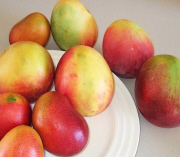 Mangoes are one of the many delicious, nutritious fruits there are. There are quite a bit of minerals, vitamins and nutrients that you will find in them. These include Protein, Calcium, Iron, Vitamins K and E, Iron, Thiamin, Riboflavin, Niacin, Folate, Pantothenic Acid, Magnesium, Phosphorus, Potassium, Copper, Selenium and Manganese, Dietary Fiber, Vitamin A, Vitamin B6 and Vitamin C. All these play an important role in our bodies, providing us with great health benefits. We will look at these in a moment.
Mangoes are one of the many delicious, nutritious fruits there are. There are quite a bit of minerals, vitamins and nutrients that you will find in them. These include Protein, Calcium, Iron, Vitamins K and E, Iron, Thiamin, Riboflavin, Niacin, Folate, Pantothenic Acid, Magnesium, Phosphorus, Potassium, Copper, Selenium and Manganese, Dietary Fiber, Vitamin A, Vitamin B6 and Vitamin C. All these play an important role in our bodies, providing us with great health benefits. We will look at these in a moment.
You can have a mango in many different forms. It can be fresh, dried, in chutney, salsas, juice, flavoring, in ice-cream, sorbets, fruit salads, smoothies, milkshakes, desserts, fruit salads, fruits bars, nectar, the list goes on. Mangoes are also added to cereals such as muesli and oat granola. It's more than apparent that if one wants lead a healthy eating lifestyle, they have got to add fruits and vegetables into their diet, as well as all the other food groups that you find in the food pyramid diagram, in the appropriate quantities of course.
Mango Health Benefits
We will now take a brief look at the health benefits that we gain from consuming mangoes, in whichever form that you fancy. The nutritional make up of mangoes, which is what we have listed in the beginning of this article, makes them have many great advantages for our bodies.
Due to the fact that mangoes are in most cases an excellent, in some a good, source of Vitamin C, it makes them great for helping to deal with scurvy. Scurvy is a disease that is caused by a diet deficient in Vitamin C, so it's apparent that the addition of Vitamin C in one's eating plan will solve this problem. Other fruits and vegetables that are a good source of Vitamin C include strawberries, guavas, oranges and all citrus fruits, broccoli and spinach just to name a few.
Mangoes are also great to include in one's pregnancy diet. This is because they contain Folate which amongst other things helps prevent the occurrence of neural tube birth defects as well as the risk of miscarriage. Morning sickness is also something that mangoes may help alleviate in expecting mothers. Not only do mommies-to-be get benefits from eating mangoes. Anyone can reap the benefits of consuming this fruit.
Because mangoes are a rich source of Vitamins A, E and Selenium, they help to protect against heart disease as well as prevent the risk of heart attacks. The potassium present in mangoes also helps to improve the heartbeat\'s regularity and maintain our blood pressure at optimum levels. As we have mentioned, mangoes are a good source of Vitamin A, this means good eye health is promoted by eating them, as this is one of the health benefits of Vitamin A.
Mangoes also contain pectin which lowers the risk of gastrointestinal tract cancer. Pectin together with Vitamin C and Dietary Fiber also lower LDL "bad" cholesterol levels in the blood. Anemic individuals may also benefit from eating mangoes if they are looking for natural ways to add iron into their diet in addition to their iron supplements. Mangoes also aid in weight gain, menstrual disorders, heat stroke, dysentery, bacterial infections, diarrhea, piles, hair loss, constipation, indigestion and liver disorders amongst many other things.
African Mango Nutrition Facts
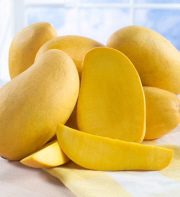 The African mango is a fairly new discovery to the food world, especially with it's discovered health benefits. The main thing it has been used for is in aiding with weight loss. Just how does it do this you may wonder? African mango nutrition facts show that it contains a substance known as Leptin. This is the substance, if it drops in our blood levels, triggers hunger. Because the African mango contains leptin it means eating it leaves u satiated for longer and this is especially helpful for one who wants to lose weight. In addition to this the African mango is also said to aid in speeding up your metabolism and increase energy.
The African mango is a fairly new discovery to the food world, especially with it's discovered health benefits. The main thing it has been used for is in aiding with weight loss. Just how does it do this you may wonder? African mango nutrition facts show that it contains a substance known as Leptin. This is the substance, if it drops in our blood levels, triggers hunger. Because the African mango contains leptin it means eating it leaves u satiated for longer and this is especially helpful for one who wants to lose weight. In addition to this the African mango is also said to aid in speeding up your metabolism and increase energy.
Other health benefits known from eating the African mango include regulating your blood sugar level, which is most helpful for those who are diabetic, lowering blood cholesterol levels as well as keeping the digestive system in a healthy condition due to its fiber content. We will now take a look at some different types of mango nutrition facts as well as the different forms in which we can have it. The percent daily values (DV) are based on a 2,000 calorie diet. Your values may be higher or lower depending on your daily calorie needs.
Large Raw Mango Nutrition Facts
Nutrition facts of a large raw mango reveal that it\'s a source of Protein, Calcium, Iron, Vitamins K and E, Iron, Thiamin, Riboflavin, Niacin, Folate, Pantothenic Acid, Magnesium, Phosphorus, Potassium, Copper, Selenium and Manganese. It is also a good source of Dietary Fiber, Vitamin A, Vitamin B6 and an excellent source of Vitamin C, providing you with 76% of your daily value of the Vitamin. As you may already know, Vitamin C is an essential immune system booster and the only cure for scurvy.
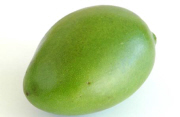
- Serving size- 165g
- Calories- 107
- Calories from Fat- 4
- Total Fat- 0g
- Saturated Fat- 0g
- Cholesterol- 0mg
- Sodium- 3mg, 0% of DV
- Total Carbohydrate- 28g, 9% of DV
- Dietary Fiber- 3g, 12% of DV
- Sugars- 24g
- Protein- 1g, 2% DV
- Vitamin A- 25% of DV
- Vitamin C- 76% of DV
- Calcium- 2% of DV
- Iron- 1% of DV
- Vitamin E- 9% of DV
- Vitamin K- 9% of DV
- Thiamin- 6% of DV
- Riboflavin- 6% of DV
- Niacin- 5% of DV
- Vitamin B6- 11% of DV
- Folate- 6% of DV
- Pantothenic Acid- 3% of DV
- Magnesium- 4% of DV
- Phosphorus- 2% of DV
- Potassium- 7% of DV
- Copper- 9% of DV
- Manganese- 2% of DV
- Selenium- 1% DV
Dried Mango Nutrition Facts
Dried mango nutrition facts show that they are a good source of Dietary Fiber and Vitamin C. Dietary Fiber amongst other things aids in digestion. Vitamin C also acts as an antioxidants, fighting against free radicals that may want to attack our bodies. The calories in dried mango are moderate to high and the sugar content is also high.
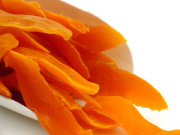
- Serving size- 100g
- Calories- 314
- Calories from Fat- 7
- Total Fat- 1g, 1% DV
- Saturated Fat- 0.2g, 1% DV
- Polyunsaturated Fat- 0.15g
- Monounsaturated Fat- 0.3g
- Cholesterol- 0mg
- Sodium- 6mg, 0% of DV
- Total Carbohydrate- 82g, 27% of DV
- Dietary Fiber- 5.2g, 21% DV
- Sugars- 75g
- Protein- 2g
- Vitamin A- 0% DV
- Vitamin C- 27% DV
- Calcium- 3% DV
- Iron- 2% DV
Frozen Mango Nutrition Facts
Frozen mango nutrition facts help us understand what we will gain from consuming frozen mangoes. We can see that they are a good source again of Dietary Fiber as well as Vitamin A. They are also an excellent source of Vitamin C. Another good thing is that they are low in calories.
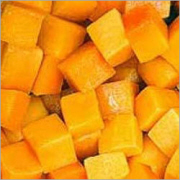
- Serving size- 3/4 cup
- Calories- 90
- Calories from Fat- 0
- Total Fat- 0g
- Saturated Fat- 0g
- Cholesterol- 0mg
- Sodium- 0mg
- Total Carbohydrate- 24g, 8% of DV
- Dietary Fiber- 3g, 12% of DV
- Sugars- 21g
- Protein- 0g
- Vitamin A- 20% of DV
- Vitamin C- 60% of DV
- Calcium- 0% of DV
- Iron- 0% of DV
Mango Nutrition Facts: Juice Smoothie
Jamba Juice Smoothie Mango nutrition facts reveal that it is especially an excellent source of the antioxidants Vitamins A and C, giving you 104% and 139% respectively of your recommended daily allowance. It is also a good source of Dietary Fiber and Calcium. When it comes to calories, mango juice is moderate.
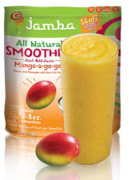
- Serving size- Sixteen size (408g)
- Calories- 188
- Calories from Fat- 7
- Total Fat- 1g, 1% DV
- Saturated Fat- 0g
- Cholesterol- 2mg, 1% DV
- Sodium- 154mg, 6% of DV
- Total Carbohydrate- 44g, 15% of DV
- Dietary Fiber- 3g, 15% of DV
- Sugars- 39g
- Protein- 5g, 11% DV
- Vitamin A- 104% of DV
- Vitamin C- 139% of DV
- Calcium- 17% of DV
- Iron- 2% of DV
Mango Nutrition Facts: Salsa
Mango salsa is pretty low in calories and sodium, which are both good things. Too much sodium in your system may lead to hypertension. Nutrition facts on mango salsa show that it is a good source of Vitamin C and a very good source of Vitamin A. Vitamin A is especially good for the good health of your eyes.
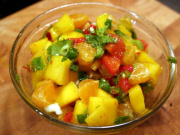
- Serving size- 2 tbsp
- Calories- 20
- Calories from Fat- 0
- Total Fat- 0g
- Saturated Fat- 0g
- Trans Fat- 0g
- Cholesterol- 0mg
- Sodium- 85mg, 4% DV
- Total Carbohydrate- 5g, 2% of DV
- Dietary Fiber- 0g
- Sugars- 3g
- Protein- 0g
- Vitamin A- 30% of DV
- Vitamin C- 20% of DV
Mango Nutrition Facts: Lassi
Mango lassi nutrition facts show that it is also low in calories. It contains 4% of your daily value of Dietary Fiber and 7% of your daily value of Protein. This makes it a source of these nutrients.
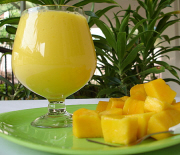
- Serving size- 1 cup
- Calories- 85
- Calories from Fat- 9
- Total Fat- 1g, 2% DV
- Saturated Fat- 0g
- Cholesterol- 4mg, 1% DV
- Sodium- 0mg
- Total Carbohydrate- 16g, 5% of DV
- Dietary Fiber- 1g, 4% DV
- Protein- 4g, 7% DV
Mango Nutrition Facts: Chutney
Chutney is one condiments that adds flavor to food. Mango chutney nutrition facts show us that it is a source of Vitamins A and C. Calories and sodium content is low.
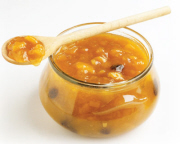
- Serving size- 1 tbsp (15g)
- Calories- 25
- Total Fat- 0g
- Saturated Fat- 0g
- Cholesterol- 0mg
- Sodium- 35mg, 1% DV
- Total Carbohydrates- 7g, 2% DV
- Sugars- 6g
- Protein- 0g
- Vitamin A- 4% DV
- Vitamin C- 2% DV
- Calcium- 0% DV
- Iron- 0% DV
Fresh Orange Mango Nutrition Facts
Fresh Orange Mango Juice Nutrition Facts reveal that it is a good source of Vitamin C and mostly a source of Dietary Fiber, Protein, Vitamin A, Calcium, Iron, Thiamin, Riboflavin, Niacin, Folate, Vitamin B6, Phosphorus, Potassium, Magnesium, Copper and Zinc.

- Serving size- 1 cup (8fl oz)
- Calories- 103
- Calories from Fat- 1
- Total Fat- 0.1g, 0% DV
- Saturated Fat- 0g
- Polyunsaturated Fat- 0.02g
- Monounsaturated Fat- 0.02g
- Cholesterol- 0mg
- Sodium- 7mg, 0% DV
- Total Carbohydrate- 27g, 9% DV
- Dietary Fiber- 0.1g, 1% DV
- Protein- 0.3g, 1% DV
- Vitamin A- 8% DV
- Vitamin C- 19% DV
- Calcium- 1% DV
- Iron- 1% DV
- Thiamin- 1% DV
- Riboflavin- 1% DV
- Niacin- 1% DV
- Folate- 2% DV
- Vitamin B6- 2% DV
- Phosphorus- 1% DV
- Potassium- 74mg, 2% DV
- Magnesium- 2% DV
- Zinc- 1% DV
- Copper- 2% DV
Green Mango Nutrition Facts
Green mango nutrition facts basically reveal that it is a good source of Dietary Fiber and a source of Vitamin C. Other than this, there isn't much else you will find in green mangoes.
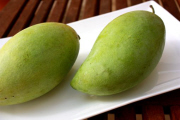
- Serving size- 165g
- Calories- 107
- Calories from Fat- 0
- Total Fat- 0
- Saturated Fat- 0g
- Cholesterol- 0mg
- Sodium- 3mg, 0% DV
- Total Carbohydrates- 28g, 9% DV
- Dietary Fiber- 3g, 12% DV
- Sugars- 3g
- Protein- 1g
- Vitamin A- 0% DV
- Vitamin C- 1% DV
- Calcium- 0% DV
- Iron- 0% DV
Red Mango Nutrition Facts: Frozen Yogurt
Red Mango is a frozen yogurt retailer. They also make smoothies, parfaits, probiotic teas and hot chocolate chillers. Their frozen yogurts contain all the goodness that yogurts contain, that is calcium and protein, as well as some active cultures which are especially helpful for our digestive system. In the table below we will look at the nutrition facts of some of the frozen yogurts you may find there.

| Product | Calories | Sodium (mg) | Carbohydrates (g) | Fiber (g) | Sugars (g) | Protein (g) |
| Original Nonfat Frozen Yogurt | 80 | 110 | 19 | 0 | 19 | 2 |
| Pomegranate Frozen Yogurt | 90 | 100 | 21 | 0 | 20 | 2 |
| Madagascar Vanilla Nonfat Frozen Yogurt | 80 | 105 | 18 | 0 | 18 | 2 |
| Tangomonium Nonfat Frozen Yogurt | 80 | 105 | 18 | 0 | 18 | 2 |
| Cocoa Nonfat Frozen Yogurt | 100 | 95 | 23 | 0 | 22 | 2 |
| Key-Lime Pie Nonfat Frozen Yogurt | 80 | 105 | 18 | 0 | 18 | 2 |
| Blueberry Nonfat Frozen Yogurt | 100 | 90 | 23 | 0 | 23 | 2 |
| White Peach Nonfat Frozen Yogurt | 100 | 90 | 23 | 0 | 23 | 2 |
| Raspberry Nonfat Frozen Yogurt | 100 | 90 | 24 | 0 | 24 | 2 |
| Wildberry Hibiscus Nonfat Frozen Yogurt | 90 | 95 | 21 | 0 | 21 | 2 |
| Lemon Green Tea Nonfat Frozen Yogurt | 90 | 95 | 21 | 0 | 21 | 2 |
| Vanilla Black Tea Nonfat Frozen Yogurt | 90 | 95 | 21 | 0 | 21 | 2 |
| Dark Chocolate Frozen Yogurt | 100 | 110 | 24 | <1 | 23 | 2 |
All these frozen yogurts contain 2% of your daily value of Vitamin C and 6% of your daily value of Calcium. The serving size of the above frozen yogurts is half a cup (93g). They also all do not contain any calories from fat, total fat, saturated fat, trans fat and cholesterol, save for dark chocolate frozen yogurt which has 0.5g of total fat.
So if a mango was your favorite fruit before you knew the benefits it came with, given this nutritional information on mangoes, it surely will remain being so. If it wasn't, for the sake of the health benefits it comes along with, you may consider making it part of your favorite fruits, not forgetting that mangoes are also delicious!


